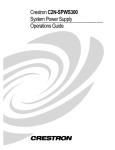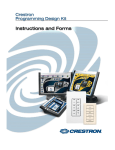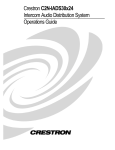Download Crestron CNX-PVID8x3 Specifications
Transcript
Crestron CNX-PVID8x3 Video Distribution Switch Operations Guide This document was prepared and written by the Technical Documentation department at: Crestron Electronics, Inc. 15 Volvo Drive Rockleigh, NJ 07647 1-888-CRESTRON All brand names, product names, and trademarks are the property of their respective owners. ©2005 Crestron Electronics, Inc. Crestron CNX-PVID8x3 Professional Video Distribution Switch Contents Professional Video Distribution Switch: CNX-PVID8x3 1 Introduction ............................................................................................................................... 1 Features and Functions ................................................................................................ 1 Specifications .............................................................................................................. 3 Physical Description.................................................................................................... 4 Industry Compliance ................................................................................................... 8 Setup .......................................................................................................................................... 8 Network Wiring........................................................................................................... 8 Identity Code ............................................................................................................... 9 Cabling and Jumpers ................................................................................................. 12 Rack Mounting .......................................................................................................... 13 Stacking..................................................................................................................... 14 Hardware Hookup ..................................................................................................... 15 Hardware Configurations .......................................................................................... 15 Signal Distribution to More than Eight Rooms ......................................................... 21 Programming Software ............................................................................................................ 23 Earliest Version Software Requirements for the PC ................................................. 23 Programming with the Crestron SystemBuilder........................................................ 23 Programming with SIMPL Windows ........................................................................ 24 Uploading and Upgrading........................................................................................................ 33 Communication Settings ........................................................................................... 34 Uploading a SIMPL Windows Program.................................................................... 36 Firmware Upgrade..................................................................................................... 38 Problem Solving ...................................................................................................................... 39 Troubleshooting......................................................................................................... 39 Further Inquiries ........................................................................................................ 40 Future Updates .......................................................................................................... 40 Return and Warranty Policies .................................................................................................. 41 Merchandise Returns / Repair Service ...................................................................... 41 CRESTRON Limited Warranty................................................................................. 41 Operations Guide - DOC. 8159A Contents • i Crestron CNX-PVID8x3 Professional Video Distribution Switch Professional Video Distribution Switch: CNX-PVID8x3 Introduction Features and Functions The Crestron® Professional Video Distribution Switch, CNX-PVID8x3, is a CAT5 video distribution system that is capable of delivering video from a large number of separate video sources like DVD players, DSS receivers, tuners, VCRs, and cameras into a multitude of separate rooms or areas. The exact number of input sources and output destinations depend on how the unit is to be used in a system: whether or not it is connected to a Crestron Room Solution Box (CNXRMC or CNXRMCLV). Its unique design and phenomenal flexibility remove design and installation constraints from residential systems integration. This unit can provide professional quality far above the level of consumer-grade equipment for sophisticated home theaters, kitchens, bedrooms, offices, and outdoor areas. Fully integrated with the Crestron control system network (Cresnet®) as a network device, the CNX-PVID8x3 is a key component in the Crestron Home® complete solution for distributing video and control throughout the home. Functional Summary • • • • • • • • Operations Guide - DOC. 8159A Accepts NTSC/PAL composite, component, and S-video sources, including HDTV Distributes 16, 24, or 32 separate video sources to as many as 8 separate rooms via CAT5 Three levels of video matrix boards; each with 16 RCA inputs and 8 RCA outputs Each input includes two RCA connectors wired in parallel; one for video input, one for termination or loop-through Each input has built-in video sync sensor to report power/activity status of source device RCA output jacks provide single-ended (local mode) video Eight RJ-45 connectors provide differential (CAT5 mode) video to up to eight rooms Internal jumpers and programming enable extensive input/output configuration flexibility Professional Video Distribution Switch: CNX-PVID8x3 • 1 Professional Video Distribution Switch Crestron CNX-PVID8x3 The CNX-PVID8x3 accepts component, S-video, and NTSC/PAL composite sources, including HDTV signals, and distributes them to display devices throughout the home via standard CAT5 structured wiring. This distribution method ensures a balanced signal for long runs, allowing the user to equalize, adjust, and boost the gain of the video signal for the perfect picture for every application, in every room. The CNX-PVID8x3 is designed with three levels of video inputs and outputs, each highly configurable for a variety of video formats. Each of the three levels of switcher boards implements a video matrix with 16 RCA inputs and eight RCA outputs for direct single ended video connection to local display devices. In addition, the CNX-PVID8x3 contains eight RJ-45 outputs for distributing any of these video signals via CAT5 mode for differential video/control to up to eight rooms throughout the house. No matter what the configuration, all inputs have a built-in video sync sensor that reports power/activity status of all source devices attached to the CNX-PVID8x3. CNX-PVID8x3 used with Crestron Room Solution Box NOTE: Systems that incorporate the CNX-PVID8x3 and Crestron Room Solution Boxes satisfy a vast number of possible applications that could be used by Crestron customers. The CNX-PVID8x3 is ideally used in tandem with a CNXRMC or CNXRMCLV in each room, which receives and decodes the CAT5 video from the CNX-PVID8x3 and supplies it to the display devices in the room. Refer to an illustration of a general application scenario after this paragraph. This video distribution solution, combined with Crestron's audio distribution switches (CNX-PAD8A or CNX-BIPAD8), a Crestron CNAMPX intelligent amplifier, and a 2-Series control system, creates a complete networked audio/video/control solution for the connected home. General Application Scenario of the CNX-PVID8x3 2-Series Control System SECURITY CAMERA CRESNET TO CNXRMC OR CNXRMCLV COMPOSITE VIDEO CNX-PVID8x3 COMPONENT VIDEO VIDEO (CAT 5) DVD AUDIO VCR S-VIDEO CNX-PAD8A OR CNX-BIPAD8 AUDIO L1 R1 L8 R8 CNAMPX L1 R1 ROOM SPEAKERS L8 R8 ROOM SPEAKERS The Crestron SystemBuilder™ (SystemBuilder) can be used to facilitate the programming portion of this system. However, due to the wiring constraints between the CNX-PVID8x3 and Crestron Room Solution Boxes, each type of video source must connect to a specific group of input connectors, which is dependent on the 2 • Professional Video Distribution Switch: CNX-PVID8x3 Operations Guide - DOC. 8159A Crestron CNX-PVID8x3 Professional Video Distribution Switch hardware configuration chosen. Refer to "Hardware Configurations" on page 15 for specific connection details. CNX-PVID8x3 used without Crestron Room Solution Box In this system, the CNX-PVID8x3 has an incredible amount of flexibility with respect to making connections to all three types of video sources. For example, it is possible to have a composite source connected to INPUT 1, level 1 and an S-video source connected to INPUT 1, levels 2 and 3, simultaneously. However, the Crestron SystemBuilder cannot be used for the programming portion of this kind of system. All programming is done entirely in SIMPL Windows. Refer to "Programming with SIMPL Windows" on page 24 for guidance with respect to SIMPL Windows. Specifications The following table provides a summary of specifications for the CNX-PVID8x3. Specifications of the CNX-PVID8x3 SPECIFICATION Cresnet Power Usage DETAILS 36 Watts (1.25 Amp @ 24 VDC) Default Net ID 41 Control System Update Files 1, 2, 3 2-Series Control System Version 2.004.CUZ or later CNMSX-AV/PRO Version 5.14.02X.UPZ or later CNRACKX/-DP Version 5.14.02W.UPZ or later CEN/CN-TVAV Version 5.12.63V.UPZ or later Version 4.02.4S.UPZ or later ST-CP CNX-PVID8x3 Firmware 4 PVID_16.vx.xxx.upg or later PVID_16.s19 or later Rack space required 3U high; 1U wide Video bandwidth 100 MHz Crosstalk > -60 dB Environmental temperature range 41° to 104°F (5° to 40°C) Humidity 10% to 90% RH (non-condensing) Dimensions (with feet) Height: 5.31 in (13.49 cm) Width: 17.16 in (43.59 cm) Depth: 8.45 in (21.47 cm) (without feet) (without mounting ears) 5.21 in (13.24 cm) Weight 8.6 lb (3.87 kg) 1. The latest versions can be obtained from the Crestron website. Refer to NOTE after last footnote. 2. Crestron 2-Series control systems include the AV2 and PRO2. Consult the latest Crestron Product Catalog for a complete list of 2-Series control systems. 3. Filenames for CNX and ST-CP update files have a UPZ extension. Files on the website may be .zip or self-extracting .exe files containing the .cuz or .upz file. All can be obtained from the Downloads section of the Crestron website. To avoid program problems, make sure you are using the update file with the correct suffix letter (e.g., S, V, W, X) 4. In DETAILS, vx.xxx.x represents a version number. NOTE: Crestron software and any files on the website are for Authorized Crestron dealers and Crestron Authorized Independent Programmers (CAIP) only. New users may be required to register to obtain access to certain areas of the site (including the FTP site). Operations Guide - DOC. 8159A Professional Video Distribution Switch: CNX-PVID8x3 • 3 Professional Video Distribution Switch Crestron CNX-PVID8x3 Physical Description The CNX-PVID8x3 is housed in a black enclosure with labeling on the front and rear panels. LEDs on the front of the unit indicate the unit's status. All connections are made to the back of the unit. Refer to the following illustrations. CNX-PVID8x3 Front View CNX-PVID8x3 Rear View 4 • Professional Video Distribution Switch: CNX-PVID8x3 Operations Guide - DOC. 8159A Crestron CNX-PVID8x3 Professional Video Distribution Switch CNX-PVID8x3 Physical Views Rear View 17.16 in (43.59 cm) Top View 8.45 in (21.47 cm) Front View 19.00 in (48.26 cm) PWR 5.31 in (13.49 cm) NET 5.21 in (13.24 cm) CRESTRON CNX-PVID8X3 Two mounting ears are provided for rack mounting; four square rubber feet are provided to be attached to the base of the unit for stability and to prevent slippage in tabletop mounting or stacking configurations. CNX-PVID8x3 Ports A number of ports are provided on the back of the CNX-PVID8x3. Refer to the illustration and descriptions below. CNX-PVID8x3 Ports INPUT 1 – 16 (Levels 1 – 3) There are three levels of 16 inputs, each input has two RCA jacks connected in parallel (one for video input, one for termination or loop-through), which are used to Operations Guide - DOC. 8159A Professional Video Distribution Switch: CNX-PVID8x3 • 5 Professional Video Distribution Switch Crestron CNX-PVID8x3 connect independent video sources to the CNX-PVID8x3. Each connector is supplied with RCA terminators (75 ohm). The terminators should remain attached unless the INPUT connectors of multiple units are connected (loop-through). Refer to "Signal Distribution to More than Eight Rooms" on page 21 for a description and illustration about loop-through. The last unit in the loop must have terminators installed. All video inputs have a video sensor so that the power status of all components can be reported. Only inputs with sync can be reliably detected (composite or luminance). OUTPUT (RCA Connectors) There are three levels of eight RCA jacks (24 total) for single ended (local mode) video. NOTE: The information on the OUTPUT RCA connectors and OUTPUT RJ-45 connectors are identical; they are not independently controllable. OUTPUT (RJ-45 Connectors) There are eight RJ-45 connectors for differential video (CAT5 mode). The outputs are grouped into three pairs and correspond to the INPUT levels as shown in the table after this paragraph. Use a standard CAT5 cable. Pairing of RJ-45 OUTPUT Connector Pins with respect to the INPUT Levels RJ-45 Pinout PAIRED PIN # ASSOCIATED INPUT LEVEL 1* and 2 3 and 6 4 and 5 7 and 8 1 2 3 not connected Pin 1 JACK, REAR VIEW (TAB POSITION DOWN) * While facing the rear panel of the unit, pin 1 is located at the left side of the port. NOTE: For additional information on video connections over CAT5, refer to the latest version of the Crestron CAT5 Wiring Reference Guide (Doc. 6137) which is available from the Crestron website (http://www.crestron.com/manuals). NET This 4-pin terminal block connector is used to connect the CNX-PVID8x3 to the Cresnet system. Refer to "Network Wiring" on page 8 for details. CNX-PVID8x3 Indicators There are 29 LED indicators located on the front panel of the CNX-PVID8x3, and one on the back panel. Refer to the following illustration and descriptions. 6 • Professional Video Distribution Switch: CNX-PVID8x3 Operations Guide - DOC. 8159A Crestron CNX-PVID8x3 Professional Video Distribution Switch CNX-PVID8x3 Indicators P R O F E S S I O N A L V I D E O D I S T R I B U T I O N S W I T C H O UT PUT PWR 1 NET 2 3 4 5 6 7 8 3 A C T IV E V I D E O 2 S E L E C T IN P U T 1 1 2 3 4 5 6 7 8 9 10 11 12 13 14 15 16 CNX-PVID8X3 CRESTRON PWR (Power) This LED illuminates when 24 volts DC from the network is supplied to the CNX-PVID8x3. NET This LED illuminates when communication between the Cresnet system and the CNX-PVID8x3 is established (unit is polled on the network). Illumination indicates that the SIMPL Windows program currently loaded has a network device defined at the same Net ID as the CNX-PVID8x3. SELECT 1 - 3 These LEDs illuminate when a switcher board (levels 1 through 3) is selected. Boards can be locally selected with the SELECT pushbutton. Refer to "SELECT Pushbutton" on this page. OUTPUT 1 - 8 These eight LEDs illuminate to indicate that a video source is routed via the respective port to the corresponding room. ACTIVE VIDEO INPUT These 16 video sync indicators illuminate to signify active inputs on the selected board (level). NOTE: Only composite video and the "Y" S-video/component signal are reliably detected. If connections to the INPUT connectors are made as recommended by Crestron in "Hardware Configurations" on page 15, simply use level 1 for detection of the sync signals. SETUP LED and Pushbutton The rear panel SETUP pushbutton and its associated red LED are used for setup of the unit’s network ID during the initial configuration of a Cresnet system or when the device is being added/replaced. Refer to “Identity Code” on page 9 for detailed information. SELECT Pushbutton The front panel SELECT pushbutton allows for local selection of the boards (levels 1 through 3). Three indicators are used as feedback. Operations Guide - DOC. 8159A Professional Video Distribution Switch: CNX-PVID8x3 • 7 Professional Video Distribution Switch Crestron CNX-PVID8x3 Industry Compliance As of the date of manufacture, the CNX-PVID8x3 has been tested and found to comply with specifications for CE marking and standards per EMC and Radiocommunications Compliance Labelling. NOTE: This device complies with part 15 of the FCC rules. Operation is subject to the following two conditions: (1) these devices may not cause harmful interference, and (2) these devices must accept any interference received, including interference that may cause undesired operation. Setup Network Wiring CAUTION: In order to ensure optimum performance over the full range of your installation topology, Crestron Certified Wire, and only Crestron Certified Wire, should be used. Failure to do so may incur additional charges if support is required to identify performance deficiencies as a result of using improper wire. CAUTION: Use only Crestron power supplies for Crestron equipment. Failure to do so could cause equipment damage or void the Crestron warranty. CAUTION: Provide sufficient power to the system. Insufficient power can lead to unpredictable results or damage to the equipment. Please use the Crestron Power Calculator to help calculate how much power is needed for the system (http://www.crestron.com/calculators). NOTE: When installing network wiring, refer to the latest revision of the wiring diagram(s) appropriate for your specific system configuration, available from the Crestron website. When calculating the wire gauge for a particular Cresnet run, the length of the run and the Cresnet power usage of each network unit to be connected must be taken into consideration. If Cresnet units are to be daisy-chained on the run, the Cresnet power usage of each unit to be daisy-chained must be added together to determine the Cresnet power usage of the entire chain. If the unit is a home-run from a Crestron system power supply network port, the Cresnet power usage of that unit is the Cresnet power usage of the entire run. The length of the run in feet and the Cresnet power usage of the run should be used in the following resistance equation to calculate the value on the right side of the equation. Resistance Equation 40,000 R< LxP Where: R = Resistance (refer to the following table). L = Length of run (or chain) in feet. P = Cresnet power usage of entire run (or chain). The required wire gauge should be chosen such that the resistance value is less than the value calculated in the resistance equation. Refer to the table after this paragraph. 8 • Professional Video Distribution Switch: CNX-PVID8x3 Operations Guide - DOC. 8159A Crestron CNX-PVID8x3 Professional Video Distribution Switch Wire Gauge Values RESISTANCE WIRE GAUGE 4 16 6 18 10 20 15 22 13 Doubled CAT5 8.7 Tripled CAT5 NOTE: All network wiring must consist of two twisted-pairs. One twisted pair is the +24V conductor and the GND conductor and the other twisted pair is the Y conductor and the Z conductor. NOTE: When daisy chaining network units, always twist the ends of the incoming wire and outgoing wire that share a pin on the network connector. After twisting the ends, tin the twisted connection with solder. Apply solder only to the ends of the twisted wires. Avoid tinning too far up or the tinned end becomes brittle and breaks. After tinning the twisted ends, insert the tinned connection into the network connector and tighten the retaining screw. Repeat the procedure for the other three network conductors. Identity Code Every equipment and user interface within the network requires a unique identity code (Net ID). These codes are two-digit hexadecimal numbers from 03 to FE. The Net ID of the unit must match an ID code specified in the SIMPL Windows program. Refer to “Setting the Net ID in Device Settings” on page 25 for details of the SIMPL Windows procedure. The Net ID of each CNX-PVID8x3 has been factory set to 41. The Net IDs of multiple CNXPVID8x3s in the same system must be unique. Net IDs are changed from a personal computer (PC) via the Crestron Viewport. NOTE: For detailed information on establishing communication between the PC and control system, refer to “Communication Settings” on page 34. If communication cannot be established, refer to the “Troubleshooting Communications” section in the latest version of the 2-Series Control System Reference Guide (Doc. 6256) or the respective Operations Guide for the control system. There are two different methods—Method A or Method B—for setting the CNX-PVID8x3 Net IDs: Method A (Cresnet address-settable ID), described on the next page, applies to CNX-PVID8x3s in a Cresnet system with a 2-Series control system upgrade file (CUZ) version prior to 3.008, but can be used with later versions of firmware and requires that a single unit be the only network device connected to the control system. Method B (Touch Settable IDs), which begins on the next page, applies to CNX-PVID8x3s in a Cresnet system with 2-Series control system upgrade file (CUZ) version 3.029 or later. These upgrades enable Touch Settable ID (TSID) functionality, which makes it possible for the control system to recognize a network device via its serial number, which is stored in the device’s memory. This method does not require that any devices be disconnected from the network; Net IDs may be Operations Guide - DOC. 8159A Professional Video Distribution Switch: CNX-PVID8x3 • 9 Professional Video Distribution Switch Crestron CNX-PVID8x3 set with the entire Cresnet system intact. This method requires the use of the Crestron Viewport version 3.35 or later. Use the appropriate method to set the CNX-PVID8x3 Net ID. Method A (Cresnet address-settable ID) 1. Ensure that the CNX-PVID8x3 is the only device connected to the control system. 2. Open the Crestron Viewport. 3. From the Viewport menu, select Functions | Set Network ID. The software checks the baud rate and then opens the "Set Network ID" window. 4. In the "Set Network ID" window, select the CNX-PVID8x3 from the Current Network Devices text window. 5. Select the new Net ID for the CNX-PVID8x3 from the Choose the new network ID for the selected device (Hex): text box. 6. Click Set ID to initiate the change. This will display the "ID command has been sent" window. 7. In the "Command Complete" window, click OK. 8. In the Current Network Devices text window, verify the new Net ID code. 9. In the "Set Network ID" window, click Close. NOTE: The new Net ID code may also be verified by selecting Diagnostic | Report Network Devices in the Viewport (alternately, select F4). 10. Repeat this procedure for each CNX-PVID8x3 to be added to the system. Method B (Touch Settable IDs) Before using this method, you should have a list of all current network devices and their Net IDs, to avoid assigning duplicate IDs. Set Net ID by TSID These procedures are for TSID-enabled network devices during the initial configuration of a Cresnet system or when such devices are being added/replaced. 1. Ensure that all CNX-PVID8x3s are connected to the control system. 2. Open the Crestron Viewport version 3.35 or later. 3. From the Viewport menu, select Functions | Assign Cresnet ID by Serial Number. The “Set Net ID by TSID” window appears. The window is first displayed with the data fields empty. (Refer to the following figure.) 10 • Professional Video Distribution Switch: CNX-PVID8x3 Operations Guide - DOC. 8159A Crestron CNX-PVID8x3 Professional Video Distribution Switch “Set Net ID by TSID” Window 4. Click on the Search for Touch Settable Devices button. The system searches the network and lists all TSID-enabled devices found. The list is similar to the report produced by pressing F4 (Report Network Devices); the first eight digits of each line constitute the TSID number (hexadecimal form of the serial number). 5. As you enter either the serial number or TSID number of the device that requires a change, the corresponding TSID or serial number automatically appears in its appropriate field, and the list scrolls to and highlights the device listing. The listing should show the device’s current Cresnet ID. 6. Enter the Cresnet ID that the device should be set to and click OK. The number you enter should appear on the list. CAUTION: This function does not prevent you from setting duplicate IDs. Be sure to check current assignments before entering the desired Cresnet ID number. Serial Number to TSID Conversion This utility is useful in a case where there are multiple devices of the same type on a network, you need to locate a particular one, you know the TSID but not the serial number, and your site installation list is based on device serial numbers. In this (or the reverse) situation, do the following: Operations Guide - DOC. 8159A 1. Open the Crestron Viewport. 2. From the Viewport menu, select Functions | Serial Number ÅÆ TSID Conversion Tool. The “Serial Number ÅÆTSID Conversion Tool” window is displayed. (Refer to the following figure.) Professional Video Distribution Switch: CNX-PVID8x3 • 11 Professional Video Distribution Switch Crestron CNX-PVID8x3 “Serial Number to TSID Conversion Tool” Window 3. Enter the serial number or TSID number as instructed; press the appropriate button to obtain the corresponding number. NOTE: Enter serial numbers, including spaces, exactly as they appear on the unit label. Alpha characters in serial numbers or TSID numbers may be entered in upper or lower case. Cabling and Jumpers Out of the box, the CNX-PVID8x3 provides three 16x8 crosspoint boards that can be operated independently or in parallel. However, versatility was built into the unit. Depending on how the three boards are cabled and/or jumpered, the unit can be used in different hardware configurations. For example, cabling boards 1 and 3 conceptually eliminates level 3 (thus component sources are not allowed with this configuration) and extends level 1 with 16 composite-only connections. Furthermore, installation of the cable assembly and removal of jumpers splits level 3 (thus component sources are restricted to inputs 9 through 16) and extends level 1 with eight composite-only connections. NOTE: Possible configurations and their respective applications when the CNX-PVID8x3 is connected to Crestron Room Solution Boxes are summarized in "Hardware Configurations" on page 15. Furthermore, cabling and jumper removal may prove useful in systems where the CNX-PVID8x3 does not connect to a Crestron Room Solution Box. Refer to "Programming with SIMPL Windows" on page 24 for details of how each configuration is represented in SIMPL Windows. If the out-of-the-box configuration is desired, the following procedure, which defines how to install the cable and remove jumpers, need not be completed. If one of the other configurations is required, the only tools needed to complete this procedure are a #2 Phillips screwdriver and a grounding strap (grounded workstation). CAUTION: The CNX-PVID8x3 contains ESD sensitive devices. Perform the following procedure while wearing a grounding strap that is properly grounded, or on a grounded workstation to avoid damaging the unit. NOTE: This procedure assumes that the CNX-PVID8x3 does not have rack ears attached and has yet to be connected to the network. 1. Place the CNX-PVID8x3 right side up on a flat surface. 12 • Professional Video Distribution Switch: CNX-PVID8x3 Operations Guide - DOC. 8159A Crestron CNX-PVID8x3 Professional Video Distribution Switch 2. Using a #2 Phillips screwdriver, remove the 16 cover screws from the top (four screws) and sides (six per side) of the CNX-PVID8x3. 3. Lift and remove the CNX-PVID8x3 top cover. 4. Use the supplied cable (15863) to connect board 1 (bottom board) to board 3 (top board), as shown in the diagram that follows this step. Location of Cable Connection (Side View of Unit) USE CABLE FOR CONNECTION OF LEVEL 1 TO LEVEL 3 ONLY 5. If the desired application requires removal of the jumpers, remove the nine jumpers from level 3 (top board) only, as shown in the diagram after this step. Otherwise, skip this step and step 6. Location of Jumpers (Top View with Cover Removed) TO SPLIT LEVEL 3, REMOVE NINE JUMPERS (FROM LEVEL 3 ONLY) JUMPER HOLDER STORES REMOVED JUMPERS NOTE: Eight of the nine jumpers are grouped together. Do not forget to remove the ninth jumper that is located separately from the other eight. 6. Store jumpers removed in step 5 on the jumper holder, as shown in the diagram that precedes this step. 7. Place the cover over the unit (observe proper orientation with respect to front and back panels) and secure with 16 cover screws. 8. Tighten screws to finger-tight, then, using a #2 Phillips screwdriver, tighten an additional 1/8-turn. Rack Mounting WARNING: To prevent bodily injury when mounting or servicing this unit in a rack, take special precautions to ensure that the rack remains stable. The following guidelines are provided to ensure user safety. Operations Guide - DOC. 8159A Professional Video Distribution Switch: CNX-PVID8x3 • 13 Professional Video Distribution Switch Crestron CNX-PVID8x3 • The unit should be mounted at the bottom of the rack if it is the only unit in the rack. • When mounting this unit in a partially filled rack, load the rack from the bottom to the top with the heaviest component at the bottom of the rack. • If the rack is provided with stabilizing devices, install the stabilizers before mounting or servicing the units in the rack. NOTE: If rack mounting is not required, rubber feet are provided for tabletop mounting or stacking. Apply the feet near the corner edges on the underside of the unit. Refer to "Stacking" on page 14 for details. NOTE: Reliable grounding of rack-mounted equipment should be maintained. Particular attention should be given to supply connections other than direct connections to the branch circuit (e.g., use of power strips). Two "ears" are provided with the CNX-PVID8x3 so that the unit can be rack mounted. These ears must be installed prior to mounting. Complete the procedure below to attach ears to the CNX-PVID8x3. The only tool required for this procedure is a #2 Phillips screwdriver. 1. Position a rack ear so that its drilled holes align with the four vacant holes located on one side of the CNX-PVID8x3. 2. Use four screws (supplied, #6-32, 3/8"L) to secure the ear to the CNX-PVID8x3, as shown in the following diagram. Ear Attachment for Rack Mounting (Side View of Unit) FASTEN EACH EAR WITH FOUR SCREWS (SUPPLIED) 3. Tighten screws to finger-tight, then, using a #2 Phillips screwdriver, tighten an additional 1/8-turn. 4. Repeat procedure (steps 1 and 2) to attach ear to the other side. 5. If the rear panel of the CNX-PVID8x3 is accessible when mounted in the rack, install the CNX-PVID8x3. If the rear panel is NOT accessible, perform the hookup procedure before rack installation. Stacking Four "feet" are provided with the CNX-PVID8x3 so that if the unit is not rack mounted, the rubber feet can provide stability when placed on a flat surface or stacked. These feet should be attached prior to the hookup procedure. Refer to the following illustration for placement of the feet. 14 • Professional Video Distribution Switch: CNX-PVID8x3 Operations Guide - DOC. 8159A Crestron CNX-PVID8x3 Professional Video Distribution Switch Feet Location (Bottom View of Unit) ATTACH FEET NEAR CORNERS OF THE UNIT Hardware Hookup Refer to the hookup diagram after this paragraph. Other than making the power connection last, complete the connections in any order. NOTE: For specific details regarding input connections, refer to "Hardware Configurations" on page 15 if the CNX-PVID8x3 connects to Crestron Room Solution Boxes within the system. NOTE: Refer to "Network Wiring" on page 8 when making connections to the port labeled NET. Hookup Connections for the CNX-PVID8x3 INPUT: CRESNET: FROM VIDEO SOURCES TO CONTROL SYSTEM AND OTHER CRESNET DEVICES (ACCEPTS COMPONENT, S-VIDEO, NTSC/PAL COMPOSITE) OUTPUT: OUTPUT: SINGLE ENDED (LOCAL) VIDEO TO MONITOR OR DISPLAY DIFFERENTIAL VIDEO TO ROOM SOLUTION BOX Hardware Configurations NOTE: The hardware configurations described in the following sections only apply to systems where the CNX-PVID8x3 connects to Crestron Room Solution Boxes. The Crestron SystemBuilder can generate a program that fits into one of these configurations. The CNX-PVID8x3 is constructed with three crosspoint boards; each implements a 16x8x1 matrix. The physical boards are labeled on the back of the unit as "levels" 1, 2, and 3 from bottom to top. Component sources connect to levels 1 through 3 per input (connect Y to level 1, Pb to level 2, and Pr to level 3). S-video sources use levels 1 and 2 per input (connect Y to level 1 and C to level 2). Composite sources should connect to level 1 only (including level 3 extensions of level 1when boards 1 Operations Guide - DOC. 8159A Professional Video Distribution Switch: CNX-PVID8x3 • 15 Professional Video Distribution Switch Crestron CNX-PVID8x3 and 3 are connected via the cable assembly). Refer to the table after this paragraph for a tabulation of the relationship between input levels and video formats. Relationship of Video Formats to Input Levels LEVEL \ VIDEO FORMAT COMPONENT (connects to three levels) S-VIDEO (connects to two levels) COMPOSITE (connects to one level*) Pr Pb Y not connected C Y not connected* not connected COMP 3 2 1 * Composite sources can physically connect to level 3 when boards 1 & 3 are connected via the cable assembly. Depending on how the internal boards are cabled/jumpered, the unit can be used in different configurations (each is discussed in the following subsections). Refer to the flowchart below to determine which configuration to use (based on the source types in the system). NOTE: Crestron recommends the out-of-the-box configuration, because it allows for the distribution of a large number of sources with the greatest flexibility and there is no need to open the unit. The other configurations permit a greater number of sources, but are not as flexible. The other configurations also require cabling of boards and possibly the removal of jumpers. Flowchart: Determine the Configuration Determine the configuration based on the sources in the system. Are there more than 16 sources in the system? No Use the out-ofthe-box configuration. Yes Consider adding another CNX-PVID8x3 to the system. No Are there eight or fewer component sources in the system? Yes Are there component sources in the system? No Is the number of component and S-video sources in the system less than 16? No Yes Are there eight or fewer S-video sources in the system? Are there 16 or fewer composite sources in the system? Yes Yes Are there eight or fewer composite sources in the system? Are there 16 or fewer S-video sources in the system? No Consider adding another CNX-PVID8x3 to the system. Yes Yes Consider adding another CNX-PVID8x3 to the system. No Yes Use the limited quantity of anytype configuration. No Is the number of S-video and composite sources in the system less than 32? No Consider adding another CNX-PVID8x3 to the system. Yes Use the composite/S-video only configuration. No Consider adding another CNX-PVID8x3 to the system. No Is the number of component, Svideo, and composite sources in the system less than 24? Yes 16 • Professional Video Distribution Switch: CNX-PVID8x3 Operations Guide - DOC. 8159A Crestron CNX-PVID8x3 Professional Video Distribution Switch Out-of-the-Box Configuration AKA: 16 Sources of Any Type (Video, S-Video, Component) This configuration is aptly named because the internal jumpers are intact, as shipped, and the supplied cable assembly is not used. Therefore, the unit is ready for immediate use and is capable of distributing a combination of up to 16 sources of any type. The built-in versatility of this configuration makes it the most popular and easiest to use. NOTE: Installers only need to consider another configuration if the system consists of more than 16 sources. The following figure illustrates the out-of-the-box configuration—three 16X8 switchers in a stack. In this configuration as well as the others, the inputs connected to a given level can only be routed to the outputs for that level. The illustration after this paragraph depicts a system that utilizes the CNX-PVID8x3 and contains a combination of 16 or fewer composite, S-video, and component sources. Notice that each input (labeled 1 through 16) can connect to a single source. The sequence of video signal type is irrelevant. Levels 1 through 3 are always switched together. Illustration of Out-of-the-Box Configuration Cabling and Jumpering of Internal Boards: Cable between level 1 and level 3 is not attached. Nine jumpers remain in their original location (no jumpers on the jumper holder). 1 2 3 4 5 6 7 INPUT 8 9 10 11 12 13 14 15 16 G 1 OUTPUT 2 3 NET 4 SETUP 24 Y Z G 3 5 6 7 8 1 2 3 4 1 2 5 6 OUTPUT 3 4 7 8 2 5 6 7 8 1 2 3 4 5 6 7 8 1 C RES T RO N E L E C T R O N IC S I N C . R O C K L E IG H , N . J . 0 7 6 4 7 USA NOTES: COMPONENT - CONNECTS TO 1, 2, & 3. S-VIDEO - CONNECTS TO 1 & 2 ONLY. COMPOSITE - CONNECTS TO 1 ONLY. EACH SOURCE CONNECTS TO A SINGLE INPUT (LABELED 1 THROUGH 16). THE SEQUENCE OF SOURCES IS INDEPENDENT OF VIDEO FORMAT. MAXIMUM NUMBER OF SOURCES ALLOWED WITH THIS CONFIGURATION IS 16. Operations Guide - DOC. 8159A Professional Video Distribution Switch: CNX-PVID8x3 • 17 Professional Video Distribution Switch Crestron CNX-PVID8x3 Cabled Configuration (Composite/S-Video Only) AKA: 16 Video & Up to 16 S-Video or Video Sources NOTE: Dealing with a system that contains more than 16 sources? This configuration may be preferred as long as the system does not contain component video. To achieve this configuration, the unit must be opened and the cable assembly attached. Refer to "Cabling and Jumpers" on page 12 for details. The internal jumpers remain intact. The following figure shows the effect of connecting the cable between the level 1 and level 3 boards. The level 3 inputs become an extension of the level 1 board, resulting in a logical 32X8 switcher on level 1 and a 16X8 switcher on level 2; the level 3 outputs are not used. Conditions of this configuration; please read carefully! This configuration allows for the greatest number of sources, 32. However, those sources can only be composite (up to 32, when there is no S-video) and S-video (up to 16, maximum). The illustration after this paragraph provides a visual depiction of a system that utilizes the CNX-PVID8x3 in the composite/S-video only configuration. Notice that S-video sources can only be connected to input 1 through 16 (connect Y to level 1 and C to level 2). Installation of the cable assembly conceptually eliminates level 3 (thus component sources are not allowed with this configuration) and extends level 1 with 16 composite-only connections. Of course, if there are fewer than 16 S-video sources in the system, the number of composite sources can increase as long as the total number of composite and S-video sources does not exceed 32. NOTE: The composite sources connected to level 3 are switchable to the output on level 1. 18 • Professional Video Distribution Switch: CNX-PVID8x3 Operations Guide - DOC. 8159A Crestron CNX-PVID8x3 Professional Video Distribution Switch Illustration of Composite/S-Video Only Configuration Cabling and Jumpering Internal Boards: PHYSICAL CONNECTIONS: 1 Cable between level 1 and level 3 is in place. 2 3 4 5 6 7 INPUT 8 9 10 11 12 3 13 14 15 16 COMPOSITE SOURCES*: PHYSICALLY CONNECT TO LEVEL 3 (INPUTS 1 THROUGH 16), BUT ARE LOGICALLY AN EXTENSION OF LEVEL 1. 2 Nine jumpers remain in their original location (no jumpers on the jumper holder). S-VIDEO SOURCES: PHYSICALLY CONNECT TO LEVELS 1 & 2 (INPUTS 1 THROUGH 16) ONLY. 1 C R E S T R O N E L E C T R O N IC S I N C . R O C K L E I G H , N . J . 0 7 6 4 7 U S A REFER TO THE LOGICAL DEPICTION (SHOWN BELOW) OF THE PHYSICAL CONNECTIONS (SHOWN ABOVE). LOGICAL DEPICTION: INPUTS 1 2 3 4 5 6 7 8 9 10 11 12 13 14 15 16 *COMPOSITE SOURCES CAN CONNECT TO LEVEL 1 (WHEN THERE ARE FEWER THAN 16 S-VIDEO SOURCES). HOWEVER, THE TOTAL NUMBER OF COMPOSITE AND S-VIDEO SOURCES CANNOT EXCEED 32. SWITCHABLE TO: 17 18 19 20 21 22 23 24 25 26 27 28 29 30 31 32 LEVEL 2 OUTPUT LEVEL 2 LEVEL 1 LEVEL 3 UP TO 16 S-VIDEO SOURCES ARE PERMITTED NOTE: WHEN THERE ARE FEWER THAN 16 S-VIDEO SOURCES, COMPOSITE SOURCES CAN CONNECT TO LEVEL 1. OUTPUT LEVEL 1 16 (OR MORE) COMPOSITE SOURCES* ARE PERMITTED. NOTE: THE LABELING OF INPUTS 17 THROUGH 32 BECOMES USEFUL WHEN PROGRAMMING. Split Board Configuration (Limited Quantity of Any Input Type) AKA: 8 Video, Up to 8 S-Video/Video, and Up to 8 Component/S-Video/Video Sources NOTE: Dealing with a system that contains more than 16 sources? This configuration may be preferred as long as the system does not contain more than eight component video sources. This configuration somewhat mimics the out-of-the-box configuration, but there are differences. The first difference is that jumpers need to be removed and the cable assembly must be attached. Refer to "Cabling and Jumpers" on page 12 for details. Secondly, even though the total number of mixed sources allowed in this configuration is greater, it does not permit more than eight component sources at any time. The following figure illustrates the effect of connecting the cable between the level 1 and level 3 boards and removing the jumpers from the level 3 board. Eight level 3 inputs become an extension of the level 1 board, resulting in a logical 24X8 switcher on level 1, a 16X8 switcher on level 2; and an 8X8 switcher on level 3. Operations Guide - DOC. 8159A Professional Video Distribution Switch: CNX-PVID8x3 • 19 Professional Video Distribution Switch Conditions of this configuration; please read carefully! Crestron CNX-PVID8x3 This configuration allows for up to 24 sources. However, those sources cannot exceed more than eight component, more than 16 S-video (assuming no component sources), more than 24 composite (when there is no S-video and no component). The illustration after this paragraph depicts a system that utilizes the limited quantity of any-type configuration. Notice that component sources can only be connected to input 9 through 16 (levels 1, 2, & 3) and that S-video sources can only connect to input 1 through 8 (levels 1 and 2). Installation of the cable assembly and removal of jumpers splits level 3 (thus component sources are restricted to inputs 9 through 16) and extends level 1 with eight composite-only connections. Of course, if there are fewer than eight component (or eight S-video) sources in the system, the number of S-video and/or composite sources can increase as long as the total number of sources does not exceed 24. Illustration of Limited Any-Type Configuration Cabling and Jumpering Internal Boards: PHYSICAL CONNECTIONS: Cable between level 1 and level 3 is in place. Nine jumpers are removed from their original location and stored on the jumper holder. 1 2 3 4 5 6 7 *COMPOSITE SOURCES CAN CONNECT TO LEVEL 1, INPUTS 1 THROUGH 8 (WHEN THERE ARE LESS THAN EIGHT S-VIDEO SOURCES). COMPOSITE SOURCES CAN ALSO CONNECT TO LEVEL 1, INPUTS 9 THROUGH 16 (WHEN THERE ARE LESS THAN EIGHT COMPONENT SOURCES). HOWEVER, THE TOTAL NUMBER OF COMPOSITE, S-VIDEO, AND COMPONENT SOURCES CANNOT EXCEED 24. COMPOSITE SOURCES*: PHYSICALLY CONNECT TO LEVEL 3 (INPUTS 1 THROUGH 8), BUT ARE LOGICALLY AN EXTENSION OF LEVEL 1. INPUT 8 9 10 11 12 13 14 15 16 3 COMPONENT SOURCES: PHYSICALLY CONNECT TO LEVELS 1, 2, & 3 (INPUTS 9 THROUGH 16) ONLY. 2 1 C REST RO N E L E C T R O N IC S IN C . R O C K L E IG H , N . J . 0 7 6 4 7 USA S-VIDEO SOURCES**: PHYSICALLY CONNECT TO LEVELS 1 & 2 (INPUTS 1 THROUGH 8). LOGICAL DEPICTION: INPUTS **S-VIDEO SOURCES CAN CONNECT TO LEVELS 1 OR 2, INPUTS 9 THROUGH 16 (WHEN THERE ARE LESS THAN EIGHT COMPONENT SOURCES). HOWEVER, THE TOTAL NUMBER OF S-VIDEO AND COMPONENT REFER TO THE LOGICAL DEPICTION SOURCES CANNOT EXCEED 16. (SHOWN BELOW) OF THE PHYSICAL CONNECTIONS (SHOWN ABOVE). 1 2 3 4 5 6 7 8 9 10 11 12 13 14 15 16 SWITCHABLE TO: 17 18 19 20 21 22 23 24 OUTPUT LEVEL 3 LEVEL 3 PART OF LEVEL 3 LEVEL 2 LEVEL 1 EIGHT (OR MORE) S-VIDEO SOURCES** ARE PERMITTED. UP TO EIGHT COMPONENT SOURCES ARE PERMITTED. 20 • Professional Video Distribution Switch: CNX-PVID8x3 EIGHT (OR MORE) COMPOSITE SOURCES* ARE PERMITTED. OUTPUT LEVEL 2 OUTPUT LEVEL 1 NOTE: THE LABELING OF INPUTS 17 THROUGH 24 BECOMES USEFUL WHEN PROGRAMMING. Operations Guide - DOC. 8159A Crestron CNX-PVID8x3 Professional Video Distribution Switch Configuration Wiring Guidelines Once a configuration is chosen and any appropriate physical modifications to the CNX-PVID8x3 have been made, wiring can begin. Refer to the following guidelines. • Begin adding component sources at input 16 and work toward input 1 on all three levels. • Add composite sources beginning at input 1. In the out-of-box configuration, add sources on level 1. For any other configuration, begin on level 3. • S-video is places on levels 1 and 2 on any unused inputs. • Wire S-video Y on level 1; C on level 2. Wire component with green on level 1 (Y), blue on level 2 (Pb), and red on level 3 (Pr). This keeps sync for all sources on level 1, which greatly simplifies troubleshooting. • Remember to leave terminators in place on any unused input on any level. RCA outputs can be wired using the same guidelines as inputs: component beginning as output 8 and composite beginning at output 1. When using the CAT5 outputs, remember that each CAT5 connector represents all three levels of the unit. Signal Distribution to More than Eight Rooms Each CNX-PVID8x3 is capable of distributing video to eight rooms, maximum. It is possible to expand distribution to more rooms, if additional CNX-PVID8x3s are introduced to the system. Crestron recommends a maximum of four CNX-PVID8x3s per system. Therefore, video can be distributed to a maximum of 32 rooms. Each input to the unit has two RCA jacks connected in parallel (per level). Use one of the jacks for loop-through, as shown in the illustration after this paragraph. NOTE: The last unit in the loop-through connection must have terminators installed. Operations Guide - DOC. 8159A Professional Video Distribution Switch: CNX-PVID8x3 • 21 Professional Video Distribution Switch Crestron CNX-PVID8x3 Video Distribution Expansion with Additional CNX-PVID8x3s VIDEO SIGNAL SOURCE CONNECTION 1 2 1 OUTPUT 2 3 NET 4 SETUP 24 Y Z G 3 5 6 7 8 1 2 3 4 1 2 5 OUTPUT 3 4 6 7 8 SETUP 24 Y 2 5 6 7 8 1 2 3 4 5 6 7 8 8 ROOMS (EITHER RCA OR CAT5 CONNECTIONS) 1 C RE ST RO N E L E C T R O N IC LOOP-THROUGH 1 2 1 OUTPUT 2 3 NET 4 Z G 3 5 6 7 8 1 2 3 4 1 2 5 OUTPUT 3 4 6 7 8 SETUP 24 Y 2 5 6 7 8 1 2 3 4 5 6 7 8 8 ADDITIONAL ROOMS 1 C RE ST RO N E L E C T R O N IC LOOP-THROUGH 1 2 1 OUTPUT 2 3 NET 4 Z G 3 5 6 7 8 1 2 3 4 1 2 5 6 OUTPUT 3 4 7 8 2 5 6 7 8 1 2 3 4 5 6 7 8 8 ADDITIONAL ROOMS 1 C RE ST RO N E L E C T R O N IC LOOP THROUGH UP TO 4 CNX-PVID8x3s (32 ROOMS TOTAL) 22 • Professional Video Distribution Switch: CNX-PVID8x3 NOTE: LAST UNIT MUST HAVE TERMINATORS INSTALLED. Operations Guide - DOC. 8159A Crestron CNX-PVID8x3 Professional Video Distribution Switch Programming Software Have a question or comment about Crestron software? Answers to frequently asked questions (FAQs) can be viewed in the Online Help section of the Crestron website. To post a question or view questions you have submitted to Crestron’s True Blue Support, log in at http://support.crestron.com./ First-time users will need to establish a user account. You can create a program that allows you to include the CNX-PVID8x3 in a Crestron control system using the Crestron programming tools Crestron SystemBuilder™ and SIMPL Windows. These tools are intended for users with different levels of programming knowledge. The flexibility of each tool is proportional to the degree of programming expertise (i.e., the more flexible, the more a programmer needs to know and account for). Of course, one can initiate programming using the easiest method (SystemBuilder) and use advanced techniques that are available from SIMPL Windows to customize the job. Earliest Version Software Requirements for the PC NOTE: Crestron recommends that you use the latest software to take advantage of the most recently released features. The latest software is available from the Crestron website. The following are recommended software version requirements for the PC: • (Optional) SystemBuilder version 2.0 or later. Requires SIMPL Windows and Crestron Engraver. Requires SystemBuilder templates 1.10 or later. • SIMPL Windows version 2.05.22 or later. Requires SIMPL+ Cross Compiler version 1.1. • Crestron Database version 16.4.4 or later. Required by SIMPL Windows. • Crestron Engraver version 2.3.3.2 (required if using SystemBuilder). Programming with the Crestron SystemBuilder The easiest method of programming, but does not offer as much flexibility as SIMPL Windows. The Crestron SystemBuilder offers automatic programming for such residential and commercial applications as audio distribution, home theater, video conferencing, and lighting. The interface of this tool guides you through a few basic steps for designating rooms and specifying the control system, touchpanels, devices, and functionality. The Crestron SystemBuilder then programs the system, including all touchpanel projects and control system logic. Crestron SystemBuilder is fully integrated with Crestron's suite of software development tools, including SIMPL Windows, Crestron VisionTools® Pro-e (VT Pro-e), Crestron Engraver, Crestron Database, User IR Database, and User Modules Directory. Crestron SystemBuilder accesses these tools behind the scenes, enabling you to easily create robust systems. Operations Guide - DOC. 8159A Professional Video Distribution Switch: CNX-PVID8x3 • 23 Professional Video Distribution Switch Crestron CNX-PVID8x3 Programming with SIMPL Windows NOTE: The following are acceptable file extensions for programs that include a CNX-PVID8x3, developed for specific control system types: .smw projectname.smw (source file) .spz projectname.spz (compiled file for 2-series) .bin projectname.bin (compiled file for CNX generation) .csz projectname.csz (compiled file for CNX generation with SIMPL+) .ush projectname.ush (compiled file for CNX generation with SIMPL+ header file) .usp projectname.usp (source code module for SIMPL+) SIMPL Windows is Crestron's software for programming Crestron control systems. It provides a well-designed graphical environment with a number of workspaces (i.e., windows) in which a programmer can select, configure, program, test, and monitor a Crestron control system. SIMPL Windows offers drag and drop functionality in a familiar Windows® environment. NOTE: The following descriptions assume that the reader has knowledge of SIMPL Windows. If not, refer to the extensive help information provided with the software. NOTE: In the following description, the PRO2 control system is used. This section describes a sample SIMPL Windows program that includes a CNX-PVID8x3. Configuration Manager is where programmers “build” a Crestron control system by selecting hardware from the Device Library. In Configuration Manager, drag the PRO2 from the Control Systems folder of the Device Library and drop it in the upper pane of the System Views. The PRO2 with its associated communication ports is displayed in the System Views upper pane. PRO2 System View The System Views lower pane displays the PRO2 system tree (refer to following graphic). This tree can be expanded to display and configure the communications ports. Expanded PRO2 System Tree 24 • Professional Video Distribution Switch: CNX-PVID8x3 Operations Guide - DOC. 8159A Crestron CNX-PVID8x3 Professional Video Distribution Switch C2Net Device Slot in Configuration Manager To incorporate a CNX-PVID8x3 into the system, drag the CNX-PVID8x3 from the Cresnet Control Modules | Cresnet Video Modules folder of the Device Library and drop it in System Views. The PRO2 system tree displays the CNX-PVID8x3 in Slot 9, with a default Net ID of 41 as shown in the following illustration. NOTE: SIMPL Windows provides three separate symbols for the CNX-PVID8x3, each one intended for a particular system configuration. Select the appropriate one to be placed in System Views. Refer to “CNX-PVID8x3 Symbols” on page 26 for details about each symbol. NOTE: The first CNX-PVID8x3 in a system is preset with a Net ID of 41 when its symbol is dragged into the upper pane of System Views. Additional units are assigned different Net ID numbers as they are added. C2Net Device, Slot 9 Setting the Net ID in Device Settings Double-click the CNX-PVID8X3 icon to open the “Device Settings” window. This window displays the CNX-PVID8X3 device information. If necessary, select the Net ID tab to change the unit’s Net ID, as shown in the following figure. CNX-PVID8x3- “Device Settings” Window NOTE: SIMPL Windows automatically changes Net ID values of a device added to a program if a duplicate device or a device with the same default Net ID already exists in Operations Guide - DOC. 8159A Professional Video Distribution Switch: CNX-PVID8x3 • 25 Professional Video Distribution Switch Crestron CNX-PVID8x3 the program. Always ensure that the hardware and software settings of the Net ID match. For Net ID hardware setting details, refer to “Identity Code” on page 9. CNX-PVID8x3 Symbols The inputs to the CNX-PVID8x3 symbol require the analog equivalent (typically 1 through 16, but could go up to 32) so that the video source physically connected to a given input can be switched to the specified output. In SIMPL Windows, an Analog Initialize logic symbol (decimal format), as shown below, should be used to provide these analog inputs. Detail View of the Analog Initialize Symbol in SIMPL Windows' Programming Manager NOTE: The "0d" indicates no source. Depending on how the three boards of the CNX-PVID8x3 are cabled and/or jumpered, the unit can be used in different hardware configurations. The diagrams in the next three sections show three CNX-PVID8x3 symbol designations that are available in SIMPL Windows. A table accompanies each diagram and lists the inputs and their functional descriptions. Symbol Designation: CNX-PVID8x3 There is no cabling of boards or jumpers removed for this symbol designation. 26 • Professional Video Distribution Switch: CNX-PVID8x3 Operations Guide - DOC. 8159A Crestron CNX-PVID8x3 Professional Video Distribution Switch Detail View of the CNX-PVID8x3 Symbol in SIMPL Windows' Programming Manager CNX-PVID8x3 Symbol Input Descriptions INPUT(S) Operations Guide - DOC. 8159A FUNCTION(S) Src-For-Out-1Level-1 through Src-For-Out-8Level-1 Provide the analog equivalent (1 through 16) via the Analog Initialize symbol (decimal format) on this line so that the video source connected to the given input (on level 1) can be switched to the specified output on level 1. Src-For-Out-1Level-2 through Src-For-Out-8Level-2 Provide the analog equivalent (1 through 16) via the Analog Initialize symbol (decimal format) on this line so that the video source connected to the given input (on level 2) can be switched to the specified output on level 2. Src-For-Out-1Level-3 through Src-For-Out-8Level-3 Provide the analog equivalent (1 through 16) via the Analog Initialize symbol (decimal format) on this line so that the video source connected to the given input (on level 3) can be switched to the specified output on level 3. Professional Video Distribution Switch: CNX-PVID8x3 • 27 Professional Video Distribution Switch Crestron CNX-PVID8x3 CNX-PVID8x3 Symbol Output Descriptions OUTPUT(S) FUNCTION(S) Sense-in-1-Level-1 through Sense-in16-Level-1 High if a video signal is detected on the specific input (1 – 16) on level 1; otherwise, 0 (zero). Sense-in-1-Level-2 through Sense-in16-Level-2 High if a video signal is detected on the specific input (1 – 16) on level 2; otherwise, 0 (zero). Sense-in-1-Level-3 through Sense-in16-Level-3 High if a video signal is detected on the specific input (1 – 16) on level 3; otherwise, 0 (zero). This symbol designation allows the programmer to attach inputs and outputs to the CNX-PVID8x3 when it is configured as three independent levels (16 input to eight outputs). On each level, the 16 inputs can be switched to any of the eight outputs on the same level. DEPICTION OF LEVELS ON BACK OF UNIT: LEVEL 3 16 IN X 8 OUT LEVEL 2 16 IN X 8 OUT LEVEL 1 16 IN X 8 OUT DEPICTION OF SYMBOL IN SIMPL WINDOWS: VIA THE ANALOG INITIALIZE SYMBOL (DECIMAL FORMAT) ASSIGN THE ANALOG EQUIVALENT (1 - 16) OF AN INPUT TO A SPECIFIC OUTPUT (1 - 8) ON THE SAME LEVEL 28 • Professional Video Distribution Switch: CNX-PVID8x3 Src-For-Out-1-Level-1 Src-For-Out-2-Level-1 Src-For-Out-8-Level-1 Operations Guide - DOC. 8159A Crestron CNX-PVID8x3 Professional Video Distribution Switch Symbol Designation: CNX-PVID8x3J13 For this symbol designation, level 3 is connected to level 1 with the supplied cable. This is the equivalent of extending level 1 with 16 additional inputs. Detail View of the CNX-PVID8x3J13 Symbol in SIMPL Windows' Programming Manager CNX-PVID8x3J13 Symbol Input Descriptions INPUT(S) Operations Guide - DOC. 8159A FUNCTION(S) Src-For-Out-1Level-1 through Src-For-Out-8Level-1 Provide the analog equivalent (1 through 32) via the Analog Initialize symbol (decimal format) on this line so that the video source connected to the given input (on level 1, including the extension from level 3) can be switched to the specified output on level 1. Src-For-Out-1Level-2 through Src-For-Out-8Level-2 Provide the analog equivalent (1 through 16) via the Analog Initialize symbol (decimal format) on this line so that the video source connected to the given input (on level 2) can be switched to the specified output on level 2. Professional Video Distribution Switch: CNX-PVID8x3 • 29 Professional Video Distribution Switch Crestron CNX-PVID8x3 CNX-PVID8x3J13 Symbol Output Descriptions OUTPUT(S) FUNCTION(S) Sense-in-1-Level-1 through Sense-in16-Level-1 High if a video signal is detected on the specific input (1 – 16) on level 1 (including extension from level 3); otherwise, 0 (zero). Sense-in-1-Level-2 through Sense-in16-Level-2 High if a video signal is detected on the specific input (1 – 16) on level 2; otherwise, 0 (zero). Sense-in-1-Level-3 through Sense-in16-Level-3 Identical to those output signals on Sense-In-1-Level-1 through Sense-In16-Level-1. This symbol allows the programmer to attach inputs and outputs to the CNX-PVID8x3 when it is configured as two levels (one with 32 inputs to eight outputs and the other with 16 inputs to eight outputs). On level 1, the 32 inputs can be switched to any of the eight outputs on the same level. Likewise, the 16 inputs on level 2 can be switched to any of the eight outputs on level 2. DEPICTION OF LEVELS ON BACK OF UNIT: LEVEL 2 16IN X 8OUT LEVEL 1 32IN X 8OUT DEPICTION OF SYMBOL IN SIMPL WINDOWS: VIA THE ANALOG INITIALIZE SYMBOL (DECIMAL FORMAT) ASSIGN THE ANALOG EQUIVALENT (1 - 16 FROM LEVEL 1 AND 17 - 32 FROM LEVEL 3) OF AN INPUT TO A SPECIFIC OUTPUT (1 - 8) ON LEVEL 1 VIA THE ANALOG INITIALIZE SYMBOL (DECIMAL FORMAT) ASSIGN THE ANALOG EQUIVALENT (1 - 16 FROM LEVEL 2) OF AN INPUT TO A SPECIFIC OUTPUT (1 - 8) ON LEVEL 2 30 • Professional Video Distribution Switch: CNX-PVID8x3 Src-For-Out-1-Level-1 Src-For-Out-2-Level-1 Src-For-Out-8-Level-1 Src-For-Out-1-Level-2 Src-For-Out-2-Level-2 Src-For-Out-8-Level-2 Operations Guide - DOC. 8159A Crestron CNX-PVID8x3 Professional Video Distribution Switch Symbol Designation: CNX-PVID8x3J13S For this symbol designation, level 3 is divided in half by removing jumpers. Furthermore, half of level 3 (inputs 1 through 8) is connected to level 1 with the supplied cable. This is the equivalent of extending level 1 with eight additional inputs and still allowing for connections to component video sources. Detail View of the CNX-PVID8x3J13S Symbol in SIMPL Windows' Programming Manager CNX-PVID8x3J13S Symbol Input Descriptions INPUT(S) FUNCTION(S) Src-For-Out-1Level-1 through Src-For-Out-8Level-1 Provide the analog equivalent (1 through 24) via the Analog Initialize symbol (decimal format) on this line so that the video source connected to the given input (on level 1, including the extension from level 3) can be switched to the specified output on level 1. (continued on next page) Operations Guide - DOC. 8159A Professional Video Distribution Switch: CNX-PVID8x3 • 31 Professional Video Distribution Switch Crestron CNX-PVID8x3 CNX-PVID8x3J13S Symbol Input Descriptions (continued) INPUT(S) FUNCTION(S) Src-For-Out-1Level-2 through Src-For-Out-8Level-2 Provide the analog equivalent (1 through 16) via the Analog Initialize symbol (decimal format) on this line so that the video source connected to the given input (on level 2) can be switched to the specified output on level 2. Src-For-Out-1Level-3 through Src-For-Out-8Level-3 Provide the analog equivalent (9 through 16) via the Analog Initialize symbol (decimal format) on this line so that the video source connected to the given input (on half of level 3) can be switched to the specified output on level 3. CNX-PVID8x3J13S Symbol Digital Output Descriptions OUTPUT(S) FUNCTION(S) Sense-in-1-Level-1 through Sense-in16-Level-1 High if a video signal is detected on the specific input (1 – 16) on level 1 (including extension from level 3); otherwise, 0 (zero). Sense-in-1-Level-2 through Sense-in16-Level-2 High if a video signal is detected on the specific input (1 – 16) on level 2; otherwise, 0 (zero). Sense-in-1-Level-3 through Sense-in16-Level-3 High if a video signal is detected on the specific input (1 – 16) on half of level 3; otherwise 0 (zero). This symbol allows the programmer to attach inputs and outputs to the CNX-PVID8x3 when it is configured as three levels with varying quantities of inputs (one with 24 inputs to eight outputs, one with 16 inputs to eight outputs, and the other with eight inputs to eight outputs). On level 1, the 24 inputs can be switched to any of the eight outputs on the same level. Likewise, the 16 inputs on level 2 can be switched to any of the eight outputs on level 2 and the eight inputs on level 2 can be switched to any of the eight outputs on level 3. (Refer to the following figure.) 32 • Professional Video Distribution Switch: CNX-PVID8x3 Operations Guide - DOC. 8159A Crestron CNX-PVID8x3 Professional Video Distribution Switch DEPICTION OF LEVELS ON BACK OF UNIT: LEVEL 3 8 IN X 8 OUT LEVEL 2 16IN X 8OUT LEVEL 1 24IN X 8OUT DEPICTION OF SYMBOL IN SIMPL WINDOWS: VIA THE ANALOG INITIALIZE SYMBOL (DECIMAL FORMAT) ASSIGN THE ANALOG EQUIVALENT (1 - 16 FROM LEVEL 1 AND 17 - 24 FROM LEVEL 3) OF AN INPUT TO A SPECIFIC OUTPUT (1 - 8) ON LEVEL 1 VIA THE ANALOG INITIALIZE SYMBOL (DECIMAL FORMAT) ASSIGN THE ANALOG EQUIVALENT (1 - 16 FROM LEVEL 2) OF AN INPUT TO A SPECIFIC OUTPUT (1 - 8) ON LEVEL 2 VIA THE ANALOG INITIALIZE SYMBOL (DECIMAL FORMAT) ASSIGN THE ANALOG EQUIVALENT (1 - 8 FROM LEVEL 3) OF AN INPUT TO A SPECIFIC OUTPUT (1 - 8) ON LEVEL 3 Src-For-Out-1-Level-1 Src-For-Out-2-Level-1 Src-For-Out-8-Level-1 Src-For-Out-1-Level-2 Src-For-Out-2-Level-2 Src-For-Out-8-Level-2 Src-For-Out-1-Level-3 Src-For-Out-2-Level-3 Src-For-Out-8-Level-3 Example Program An example program for the CNX-PVID8x3 is available from the “Example Program” section of the Crestron website (http://www.crestron.com/exampleprograms). Search for CNX-PVID8X3 Example Program (ZIP). Uploading and Upgrading NOTE: Crestron recommends that you use the latest software and that each device contains the latest firmware to take advantage of the most recently released features. Please check the Crestron website (http://www.crestron.com/updates) for the latest versions of software and firmware. New users are required to register to obtain access to this site. Assuming a PC is properly connected to the entire system, Crestron programming software allows the programmer to upload programs and projects after their development to the system and network devices. However, there are times when the files for the program and projects are compiled and not uploaded. Instead, compiled files may be distributed from programmers to installers, from Crestron to dealers, etc. Even firmware upgrades are available from the Crestron website as new features are developed after product releases. In those instances, one has the option to upload via the programming software or to upload and upgrade via the Crestron Viewport. Operations Guide - DOC. 8159A Professional Video Distribution Switch: CNX-PVID8x3 • 33 Professional Video Distribution Switch Crestron CNX-PVID8x3 NOTE: The Crestron Viewport utility performs multiple system tasks, primarily via an RS-232 or TCP/IP connection between the control system and a PC. It is used to observe system processes, upload new operating systems and firmware, change system and network parameters, and communicate with network device consoles and touchpanels, among many other tasks. Viewport can also function as a terminal emulator for generic file transfer. All of these functions are accessed through the commands and options in the Viewport menus. Therefore, for its effectiveness as a support and diagnostic tool, the Crestron Viewport may be preferred over development tools when uploading programs and projects. The following sections define how one would upload a SIMPL Windows program or upgrade the firmware of the CNX-PVID8x3. However, before attempting to upgrade, it is necessary to establish communications. Communication Settings NOTE: For laptops and other PCs without a built-in RS-232 port, Crestron recommends the use of PCMCIA cards, rather than USB-to-serial adapters. If a USB-to-serial adapter must be used, Crestron has tested the following devices with good results: Belkin (large model) F5U103 I/O Gear GUC232A (discontinued) Keyspan USA-19QW (discontinued) Results may vary, depending on the computer being used. Other models, even from the same manufacturer, may not yield the same results. The procedure in this section provides details for RS-232 communication between the PC and the control system. If TCP/IP communication is preferred, consult the latest version of the Crestron e-Control Reference Guide (Doc. 6052) or the respective Operations Guide for the control system. These documents are available from the Crestron website. Refer to the following figure for a typical connection diagram when uploading files. NOTE: Use a standard DB9 male to female “straight-through” cable. 34 • Professional Video Distribution Switch: CNX-PVID8x3 Operations Guide - DOC. 8159A Crestron CNX-PVID8x3 Professional Video Distribution Switch Typical Connection Diagram when Uploading 1. Open the Crestron Viewport. Either launch the stand-alone version of Viewport, or start SIMPL Windows or VT Pro-e, and from the menu bar, select Tools | Viewport. 2. Refer to the figure after this step. From the Viewport menu, select Setup | Communications settings (alternatively, press Alt+D) to open the “Port Settings” window. Setup | Communications Settings Command 3. Operations Guide - DOC. 8159A Select RS-232 as the connection type. Verify that an available COM port (COM 1 is shown following this step) is selected, and that all communication parameters and necessary options from the “Port Settings” window are selected as shown. Click the OK button to save the settings and close the window. Professional Video Distribution Switch: CNX-PVID8x3 • 35 Professional Video Distribution Switch Crestron CNX-PVID8x3 “Port Settings” Window NOTE: The parameters shown in the illustration above are the port settings for a 2-Series control system. Consult the Operations Guide for the control system being used, for exact parameter selection. 4. To verify communication, select Diagnostics | Establish Communications (Find Rack). This should display a window that gives the COM port and baud rate. If communication cannot be established, refer to the “Troubleshooting Communications” section in the latest version of the 2-Series Control System Reference Guide (Doc. 6256) or the respective Operations Guide for the control system. Uploading a SIMPL Windows Program A control system source file has the extension .smw. A compiled SIMPL Windows file has the extension .spz for a 2-Series control system, .bin for CNX generation, and .csz for CNX generation with SIMPL+. The SIMPL Windows file can be uploaded to the control system using SIMPL Windows or via the Crestron Viewport. Upload via SIMPL Windows 1. Start SIMPL Windows. 2. Select File | Open to view the “Open” window, navigate to the SIMPL Window file (.smw), and click Open. 3. Select Project | Transfer Program. Upload via Crestron Viewport 1. Verify that the procedure for “Communication Settings” that begins on page 34 has been performed. 2. As shown after this step, select File Transfer | Send Program (alternatively, press Alt+P) from the Viewport menu. 36 • Professional Video Distribution Switch: CNX-PVID8x3 Operations Guide - DOC. 8159A Crestron CNX-PVID8x3 Professional Video Distribution Switch File Transfer | Send Program Command 3. The “Send Program” window appears, as shown after this step. Click Browse, locate the compiled file (.spz for PRO2), and click Open. This will display the program's header information and enable one or both of the What to Send check boxes. If the program does not contain any SIMPL+ modules, only the SIMPL Program check box will be enabled. If it does contain SIMPL+ modules, then the SIMPL+ Program(s) check box will also be enabled. Select one or both check boxes and then click Send Program to begin the transfer. NOTE: Refer to the latest version of the 2-Series Control System Reference Guide (Doc. 6256) or the respective Operations Guide for the control system for details about the other fields shown on the “Send Program” window. “Send Program” Window 4. Operations Guide - DOC. 8159A To verify that the program has been transferred successfully, select Diagnostics | Report Program Information. This should display a window that provides details about the current program loaded into the control system. Professional Video Distribution Switch: CNX-PVID8x3 • 37 Professional Video Distribution Switch Crestron CNX-PVID8x3 Firmware Upgrade A firmware upgrade file has the extension .upg. To take advantage of all the available features, it is important that the unit contains the latest firmware. Please check the Crestron website for the latest version of firmware. Not every product has a firmware upgrade, but as Crestron improves functions, adds new features, and extends the capabilities of its products, firmware upgrades are posted. To upgrade the CNX-PVID8x3 firmware, complete the following steps. 1. Make sure that “Communication Settings” that begins on page 34 has been performed. 2. As shown after this step, select File Transfer | Update Network Device Firmware from the Viewport menu. File Transfer | Update Network Device Firmware Command 3. As shown after this step, select the Net ID of the CNX-PVID8X3 and then click OK. The “Open” window appears (refer to the subsequent graphic). “Select Network ID” Window NOTE: When transferring any Cresnet file (touchpanel project/firmware), lower the port speed baud rate to 38400 to match the Cresnet bus speed. 38 • Professional Video Distribution Switch: CNX-PVID8x3 Operations Guide - DOC. 8159A Crestron CNX-PVID8x3 Professional Video Distribution Switch “Open” Window 4. Browse to the desired firmware file and click Open to begin the transfer. Problem Solving Troubleshooting The following table provides corrective action for possible trouble situations. If further assistance is required, please contact a Crestron customer service representative. CNX-PVID8x3 Troubleshooting TROUBLE CNX-PVID8x3 does not function. PWR LED does not illuminate. NET LED does not illuminate. POSSIBLE CAUSE(S) CORRECTIVE ACTION Incorrect power supply. Use a Crestron power supply with sufficient power for the network. CNX-PVID8x3 is not receiving power. Improper NET ID. Verify that cables plugged into NET ports are secure. Verify that CNX-PVID8x3 NET ID matches NET ID software program. Refer to "Identity Code" in this Operations Guide. Loose network Verify that cable plugged into NET port is connection. secure. OUTPUT LEDs Loose connection. Verify that (RCA or RJ-45) cables connected to OUTPUT ports are secure. do not illuminate. ACTIVE VIDEO Input without sync. Confirm that the input contains sync (only INPUT LEDs do composite video and the "Y" information channel (or luminence) for both S-video and the not illuminate. component signal can be reliably detected). Blurry video. Terminator missing Terminators should remain attached unless the from INPUT INPUT connectors of multiple units are connected (loop-through). The last unit in the connector. loop must have the terminators installed. Operations Guide - DOC. 8159A Professional Video Distribution Switch: CNX-PVID8x3 • 39 Professional Video Distribution Switch Crestron CNX-PVID8x3 Further Inquiries If you cannot locate specific information or have questions after reviewing this guide, please take advantage of Crestron's award winning customer service team by calling the Crestron corporate headquarters at 1-888-CRESTRON [1-888-273-7876]. For assistance in your local time zone, refer to the Crestron website (http://www.crestron.com/) for a listing of Crestron worldwide offices. You can also log onto the online help section of the Crestron website to ask questions about Crestron products. First-time users will need to establish a user account to fully benefit from all available features. Future Updates As Crestron improves functions, adds new features, and extends the capabilities of the CNX-PVID8x3, additional information and programming examples may be made available as manual updates. These updates are solely electronic and serve as intermediary supplements prior to the release of a complete technical documentation revision. Check the Crestron website periodically for manual update availability and its relevance. Updates are identified as an “Addendum” in the Download column. 40 • Professional Video Distribution Switch: CNX-PVID8x3 Operations Guide - DOC. 8159A Crestron CNX-PVID8x3 Professional Video Distribution Switch Return and Warranty Policies Merchandise Returns / Repair Service 1. No merchandise may be returned for credit, exchange, or service without prior authorization from CRESTRON. To obtain warranty service for CRESTRON products, contact the factory and request an RMA (Return Merchandise Authorization) number. Enclose a note specifying the nature of the problem, name and phone number of contact person, RMA number, and return address. 2. Products may be returned for credit, exchange, or service with a CRESTRON Return Merchandise Authorization (RMA) number. Authorized returns must be shipped freight prepaid to CRESTRON, 6 Volvo Drive, Rockleigh, N.J., or its authorized subsidiaries, with RMA number clearly marked on the outside of all cartons. Shipments arriving freight collect or without an RMA number shall be subject to refusal. CRESTRON reserves the right in its sole and absolute discretion to charge a 15% restocking fee, plus shipping costs, on any products returned with an RMA. 3. Return freight charges following repair of items under warranty shall be paid by CRESTRON, shipping by standard ground carrier. In the event repairs are found to be non-warranty, return freight costs shall be paid by the purchaser. CRESTRON Limited Warranty CRESTRON ELECTRONICS, Inc. warrants its products to be free from manufacturing defects in materials and workmanship under normal use for a period of three (3) years from the date of purchase from CRESTRON, with the following exceptions: disk drives and any other moving or rotating mechanical parts, pan/tilt heads and power supplies are covered for a period of one (1) year; touchscreen display and overlay components are covered for 90 days; batteries and incandescent lamps are not covered. This warranty extends to products purchased directly from CRESTRON or an authorized CRESTRON dealer. Purchasers should inquire of the dealer regarding the nature and extent of the dealer's warranty, if any. CRESTRON shall not be liable to honor the terms of this warranty if the product has been used in any application other than that for which it was intended, or if it has been subjected to misuse, accidental damage, modification, or improper installation procedures. Furthermore, this warranty does not cover any product that has had the serial number altered, defaced, or removed. This warranty shall be the sole and exclusive remedy to the original purchaser. In no event shall CRESTRON be liable for incidental or consequential damages of any kind (property or economic damages inclusive) arising from the sale or use of this equipment. CRESTRON is not liable for any claim made by a third party or made by the purchaser for a third party. CRESTRON shall, at its option, repair or replace any product found defective, without charge for parts or labor. Repaired or replaced equipment and parts supplied under this warranty shall be covered only by the unexpired portion of the warranty. Except as expressly set forth in this warranty, CRESTRON makes no other warranties, expressed or implied, nor authorizes any other party to offer any warranty, including any implied warranties of merchantability or fitness for a particular purpose. Any implied warranties that may be imposed by law are limited to the terms of this limited warranty. This warranty statement supercedes all previous warranties. Trademark Information All brand names, product names, and trademarks are the sole property of their respective owners. Windows is a registered trademark of Microsoft Corporation. Windows95/98/Me/XP and WindowsNT/2000 are trademarks of Microsoft Corporation. Operations Guide - DOC. 8159A Professional Video Distribution Switch: CNX-PVID8x3 • 41 Professional Video Distribution Switch Crestron CNX-PVID8x3 This page intentionally left blank. 42 • Professional Video Distribution Switch: CNX-PVID8x3 Operations Guide - DOC. 8159A Crestron CNX-PVID8x3 Professional Video Distribution Switch This page intentionally left blank. Operations Guide - DOC. 8159A Professional Video Distribution Switch: CNX-PVID8x3 • 43 Crestron Electronics, Inc. 15 Volvo Drive Rockleigh, NJ 07647 Tel: 888.CRESTRON Fax: 201.767.7576 www.crestron.com Operations Guide – DOC. 8159A 03.05 Specifications subject to change without notice.





































































